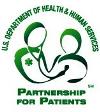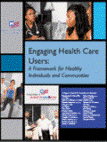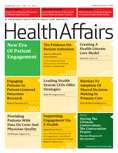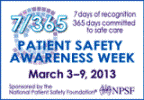| Honorarium Available for Registration and Participation in the Institute's Annapolis Intensive Training Seminar |
Registration is still available for the Institute's Moving Forward with Patient-and Family-Centered Care: Partnerships for Quality & Safety: An Intensive Training Seminar to be held April 15th–18th, 2013, in Annapolis, MD. See the Seminar Brochure and Agenda for details about the seminar.
 The Partnership for Patients patient and family engagement contractor, Weber Shandwick, has allocated resources for patient or family leaders/advocates from Hospital Engagement Network (HEN) hospitals to attend this training seminar. Participants receiving an honorarium must attend each day of the seminar, complete the seminar Action Plan, and write a blog entry (no more than 500 words) within five days of the Seminar that shares insights/experiences from the training. The Partnership for Patients patient and family engagement contractor, Weber Shandwick, has allocated resources for patient or family leaders/advocates from Hospital Engagement Network (HEN) hospitals to attend this training seminar. Participants receiving an honorarium must attend each day of the seminar, complete the seminar Action Plan, and write a blog entry (no more than 500 words) within five days of the Seminar that shares insights/experiences from the training.
According to Weber Shandwick, the "Institute's intensive training seminar will go a long way to support the aims of Partnership for Patients by helping to equip and empower interdisciplinary teams of hospital administrative leaders, physicians, nurses and other clinical staff, in conjunction with patient and family advocates, to integrate patient- and family-centered concepts within a quality and safety agenda, and to create action plans for patient- and family-centered change."
Space is limited, so please contact Karen Oliver (KOliver@webershandwick.com) or Alexandra Lewin-Zwerdling (ALewin-Zwerdling@webershandwick.com) as soon as possible for additional details and information.
Women and Infants Hospital of Rhode Island Receives Institute Pinwheel Sponsor Scholarship
 The Institute is proud to announce the award of a Pinwheel Sponsor Scholarship to Women and Infants Hospital of Rhode Island, which allows them to send an additional representative to the Institute’s Intensive Training Seminar in Annapolis. The Institute is proud to announce the award of a Pinwheel Sponsor Scholarship to Women and Infants Hospital of Rhode Island, which allows them to send an additional representative to the Institute’s Intensive Training Seminar in Annapolis.
All Pinwheel Sponsors had the opportunity to participate in a drawing to receive one additional complimentary registration fee for the Institute’s Annapolis Intensive Training Seminar.
Is your organization a Pinwheel Sponsor? Have you submitted your 2013 renewal? Contact the Institute for more information.
If your organization is not yet a Pinwheel Sponsor, please consider joining. Pinwheel Sponsorship provides many additional advantages while showing your commitment to the Institute’s mission. Learn more.
Annapolis Seminar Registration
Thinking of attending the seminar, but you or all of your team members have not registered yet? Finalize your registrations now. As this e-newsletter goes to press, limited space is still available, but note that this seminar will soon reach capacity. Seminar Registration.
|
| Parents Provide Care to Infants in Canadian Neonatal Intensive Care Unit |
The January 31, 2013 issue of BMC Pregnancy and Childbirth reported on a Canadian Family Integrated Care (FIC) model which incorporated parents as an integral part of the NICU team so that “they could provide active care for their infant, instead of being in a passive support role." This program was modeled on the “Humane Neonatal Care” model developed by Adik Levin in Talinn, Estonia. A multidisciplinary steering committee, consisting of parents of prior NICU infants, a physician, nurses, a parent educator, a lactation consultant, and a social worker, designed the Canadian FIC program. The study required that the primary caregiving parents provide at least 8 hours a day of care to their infants, especially in feeding, bathing, dressing, holding, and providing skin-to-skin care. Former NICU parents were available on the unit part of one day every week when they led or co-led FIC education sessions, and nurses from the steering committee were also available to provide bedside support.
Parents enrolled in the program received orientation, support, education, and help to chart necessary information. They also performed basic charting, and maintained a record of their own learning about how to provide care to their infants while in the NICU. Nurses were responsible for more technical aspects of care such as insertion of nasogastric catheters, and CPAP placement and adjustments.
Infant health measures, such as weight gain, improved and parents reported reduced stress and increased confidence in caring for their babies. Additionally, NICU nurses reported being more bonded with the parents participating in the study. The study concluded that the FIC model of care is feasible and safe, results in improved weight gain in preterm infants, and has the potential to improve other short and long-term infant and family outcomes.
According to Dr. Shoo Lee, who participated in this study, the FIC model will be replicated in 16 newborn intensive care centers in Canada this year. |
| American Hospital Association Report Endorses Patient and Family Engagement |
 The American Hospital Association's (AHA) Committee on Research recently released its report, Engaging Health Care Users: A Framework for Health Individuals and Communities, advocating that hospitals actively engage patients and create a hospital culture that supports patient engagement and partnership. The report defines "Health Care User Engagement," discusses the framework and strategies for it, and recommends patient engagement in four different levels of the health care system: The American Hospital Association's (AHA) Committee on Research recently released its report, Engaging Health Care Users: A Framework for Health Individuals and Communities, advocating that hospitals actively engage patients and create a hospital culture that supports patient engagement and partnership. The report defines "Health Care User Engagement," discusses the framework and strategies for it, and recommends patient engagement in four different levels of the health care system:
- Community Level
- Organizational Level
- Health Care Team Level
- Individual Level
The report includes examples of partnerships at each of these levels. For example, at the health care team level, Emory Healthcare partnered with patient/family advisors to set up a protocol for bedside change of shift to engage patients and their families as partners in goal setting, treatment decisions, and education. As a result, patient satisfaction increased and Press Ganey satisfaction scores increased dramatically. Another example at the health care team level is Cincinnati Children's Hospital Medical Center (CCHMC), as a part of the Robert Wood Johnson Foundation's Pursuing Perfection initiative, included the development of an interdisciplinary group of patients and parents to redesign patient-centered care delivery.
An example at the organizational level is Georgia Health Sciences Health System (now Georgia Regents University, formerly MCG), which has more than 200 patient and family advisors who participate in a broad variety of hospital and clinic advisory councils and committees. These patient and family advisors have provided input on key operational and strategic decisions including anesthesia staffing, medication dispensing, patient handoffs, patient and family rounding, patient safety and the design of new services, and facilities. In a three-year period, patient satisfaction scores increased and medication errors declined. In addition, patient and family advisors serve as faculty to the Health Sciences University. The lessons learned from Georgia Sciences Health System, according to the report, are that "senior leadership is key as leaders need to model the behaviors of patient- and family-centered care and continually find ways to encourage patient and family involvement."
According to the AHA, "Achieving 'Health for Life' [which is the AHA's framework for health reform] is a team effort" that "requires actions from key players within the health care system to develop a culture that supports patient and family engagement." This report states, "engaging patients, families and communities has the potential to be a 'game changer' in the transformation of the health care system in the United States."
Read the entire report. In Memoriam
 C. Everett Koop, MD, former Surgeon General of the United States, died on February 25, 2013, at the age of 96. C. Everett Koop, MD, former Surgeon General of the United States, died on February 25, 2013, at the age of 96.
Although he was most widely known among Americans as the Surgeon General who carried out a crusade to end smoking in the United States, few realize that he was an early advocate for family-centered care.
Doctor Koop partnered with the Maternal & Child Health Bureau, U.S. Department of Health & Human Services, to initiate grants to not-for-profit organizations that were committed to “family-centered, community-based, coordinated care” for children with special health care needs and their families in the 1980s. The fledging organization, the Association for the Care of Children’s Health—with Bev Johnson as Executive Director—was one of the first grant recipients.
In 1987, Dr. Koop called for a national agenda in which families would work together with professionals to improve the care of children with special health care needs. He remained an active advocate for patient- and family-centered care throughout his life, and provided leadership for integrating family-centered care and its concepts and strategies in many areas of health care and human services, including the building of HIV/AIDs systems of care. His leadership led to increased parent-professional collaboration and eventually, in the late 1980s and early 1990s, to legislation that introduced the concept of family-centered care.
Prior to becoming the Surgeon General of the United States, Dr. Koop was surgeon-in-chief for more than 30 years at The Children's Hospital of Philadelphia. He was widely regarded as the most influential Surgeon General in American history and played a crucial role in changing public attitudes about smoking and AIDS. |
|
 |
| Deadline Approaches for Submitting PCORI Advisory Panel Applications |

The deadline for submitting applications for the Patient-Centered Outcomes Research Institute (PCORI) advisory panels is March 4, 2013. PCORI is seeking patients, caregivers, clinicians, researchers, and other members of the health care community and the general public to serve on four advisory panels: Assessment of Prevention, Diagnosis, and Treatment Options; Improving Healthcare Systems; Addressing Disparities; and Patient Engagement. Advisory panel members (who are not full-time federal employees) are eligible for compensation not to exceed $1,500 annually. Applications can be submitted online until 5:00 p.m. ET, Monday, March 4.
Check out the FAQ page for more info. Learn more.
Patient and Family Advisors Network: Conversation about Quality and Safety
The PFAC Network listserv offers a great resource for patient and family advisors, and those who work with them. Recently, in response to a posting on the listserv, Mary Minniti, Institute for Patient- and Family-Centered Care's Program and Resource Specialist, convened a Conversation about Preparing Advisors for Safety and Quality. More than 25 PFAC Network members participated in the 90-minute telephone call and shared a wealth of information and ideas about what various organizations are doing to prepare advisors and staff for the participation of patient and family advisors on safety and quality committees, teams, or councils. Mary’s summary of the conversation is posted on the listserv.
Check out the PFAC Network listserv to learn more. This online community offers a forum for discussions, print resources that members post for sharing, and much more.
|
| Patient Engagement is Topic of February Health Affairs Journal |

The journal Health Affairs hosted a briefing on February 6, in Washington, DC, to discuss its February 2013 issue—New Era of Patient Engagement. In this thematic issue, a wide variety of authors "explore the evidence on patient engagement; the challenges in changing the behavior of patients and providers; and the opportunities that exist to enhance patient engagement and activation in a transformed health care system." Check out the entire February issue, or the summary in the February 14, 2013 Health Policy Brief on Patient Engagement.
The Institute Welcomes Caren Cramer The Institute is delighted to welcome Caren Cramer to the team. As Executive Assistant to the President/CEO, Caren provides support to Bev Johnson, the Institute's President and CEO, assists with projects, and functions as the office manager. Caren brings a unique blend of business communications and relationship-building skills, writing and editing experience, and an overall "can-do spirit" to the Institute. 
For 25 years, Caren honed her skills at the National Geographic Society (NGS), initially in the magazine's Cartographic division, and ultimately as the Executive Assistant to the President of National Geographic Television & Film. Caren also used her writing and editorial skills working with world-renowned scientists applying for NGS grants.
Caren is the recipient of a Parenting Publications of America (now Parenting Media Association) 2006 Bronze award and 2007 Gold award.
A graduate of Shippensburg University, Caren has a BA in Communications, Journalism, and Public Relations. She lives in rural western Maryland with her husband, two teenage children and their Chocolate Labrador Retriever. |
|


 The
The  The Institute is proud to announce the award of a Pinwheel Sponsor Scholarship to
The Institute is proud to announce the award of a Pinwheel Sponsor Scholarship to  The
The  C. Everett Koop, MD, former Surgeon General of the United States, died on February 25, 2013, at the age of 96.
C. Everett Koop, MD, former Surgeon General of the United States, died on February 25, 2013, at the age of 96. 

